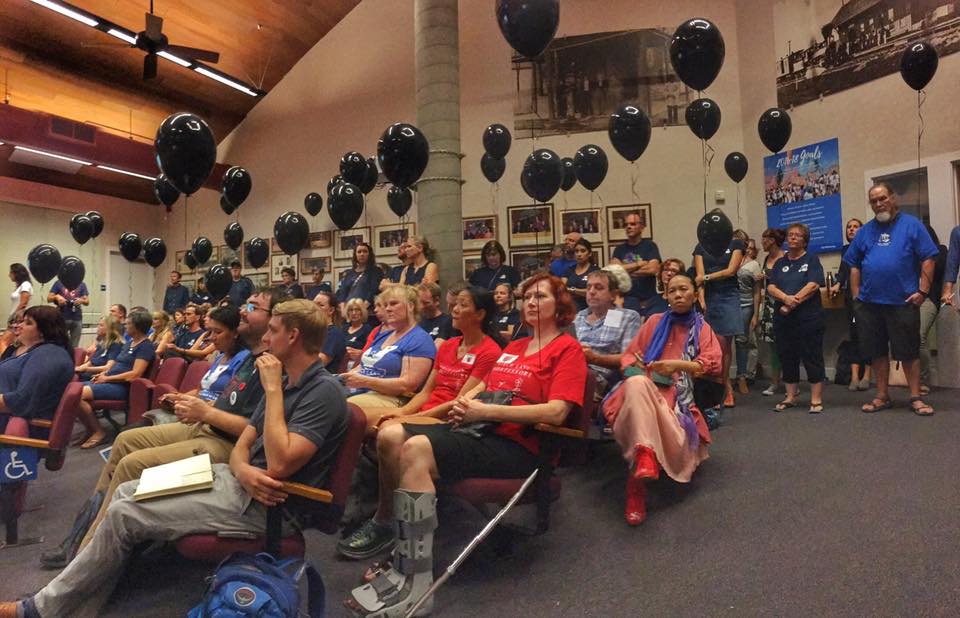
While the issue of teacher pay will not be officially on the school board agenda tonight, a group called Parents for Equity for Davis Teachers is organizing a community push for teacher pay equity.
The purpose of the action tonight, according to a Facebook event: “To ensure teachers and substitutes in DJUSD get the pay equity they deserve, we must let the Board of Education know we are following developments on this issue.”
They say, “Let’s show up again at the October board meeting and ask what progress they have made toward this goal. Wear or bring the red apple symbol to show your support!”
On a Facebook post, it says, “This week, we want to be sure the Board understands that parents are not prepared to assist with plans for school facilities unless and until the Board has some viable options for making teachers’ salaries and benefits competitive in our region.
“This will be a long struggle,” they write. “We need the Board to know that we are not giving up and we will not move on until they find a solution. Our children’s education is at stake. Our teachers need to be paid like the professionals they are, not hobbyists.”
The issue comes a month after about 80 teachers showed up at the school board meeting to ask for considerations about increased teacher pay and compensation.
At the meeting, John Bowes, reading from prepared remarks said that “while we are being proactive by identifying Personnel Scarcity as a Core Challenge, Davis Joint Unified is fortunate to be a 
district that as yet does not have an attraction or retention problem.”
At the same time, he acknowledged that “a wage gap between some neighboring districts exists.” He reiterated that “ this has not translated to a current attract and retain problem to date. In fact, we are almost fully staffed and I will talk about these details in a moment.”
However, DTA President Dianna Huculak disagreed. She said, “These were 80 colleagues, friends, and talented educators who decided to leave our school community because they did not feel that their professionalism and hard work was valued or respected by our district. The cost of not being able to retain teachers is more than a name on your certificated personnel report, the loss of our friends and colleagues ripples out into the community.”
The teachers claim that district policies mean that the policies have led to teachers working 120 percent at FTE (full-time equivalent) for substandard pay.
The basic problem that everyone seems to acknowledge is that, with the parcel tax, the district is simply an average-funded district.
As John Bowes wrote in a June op-ed, even “after adding in parcel tax revenue, DJUSD is still just an average-funded school district. If there were no local parcel taxes, DJUSD would be funded well below the state average.”
The answer isn’t so simple, Superintendent Bowes said, “in a district that is below the average state funded level for unified school districts we need to come up with creative ways to raise revenues and/or re-prioritize spending.”
But if the district is pushed to average status by the parcel tax, the district should be able to offer average compensation.
Former DTA President Blair Howard discussed ways the school district can address the funding gap.
Whatever the finances are – we trust that the district is utilizing its finances effectively,” he said. “We may be able to do certain things on the margins, but absent radical changes to the program we deliver, we’re just not going to be able to increase teacher compensation to the level at which we defined as our own issue, without additional funds from the community.”
He noted that we don’t anticipate changes to state funding or changes to the LCFF (Local Control Funding Formula).
The question is how does a district, that gets to average funding with the parcel tax, have below average compensation?
“What you’re talking about is that you have more teachers, deliver more programs. When you look at the budget from the macro-level that CTA trains people to look at, it looks like all of our numbers are healthy,” Blair Howard explained. “We spend 40 percent of the budget on certificated salaries and the admin as a total budget is within an expected range. From the big level, it looks right.”
The problem is “we get to that 40 percent because we have more people for (a) district our size.” He pointed out that “even when you look at class size, we’re not ahead. Because it’s not that we have more people to do the same amount of work, it’s that we have more people to do more work. Because we’re providing seven periods.
“That’s how we end up with average funding, above-average services, below-average pay,” he said. “If we just have average services, we can get to average pay.”
What drives the success of this district is that the community cares about education and is willing to pay for that level of education. But clearly there are tough choices now that the community is going to have to make.
At some point there needs to be an assessment about the programs that the district provides and how to pay for those programs.
But there are problems with trying to cut back on programs, as Blair Howard pointed out – “you saw what happened when they just decided to trim some German. So if you’re going to have a long public comment just to try to save German…”
The key question going forward is how the district will address this issue. Will they increase the parcel tax? Will they find other sources for revenue? Or will they cut back on educational programs?
—David M. Greenwald reporting






